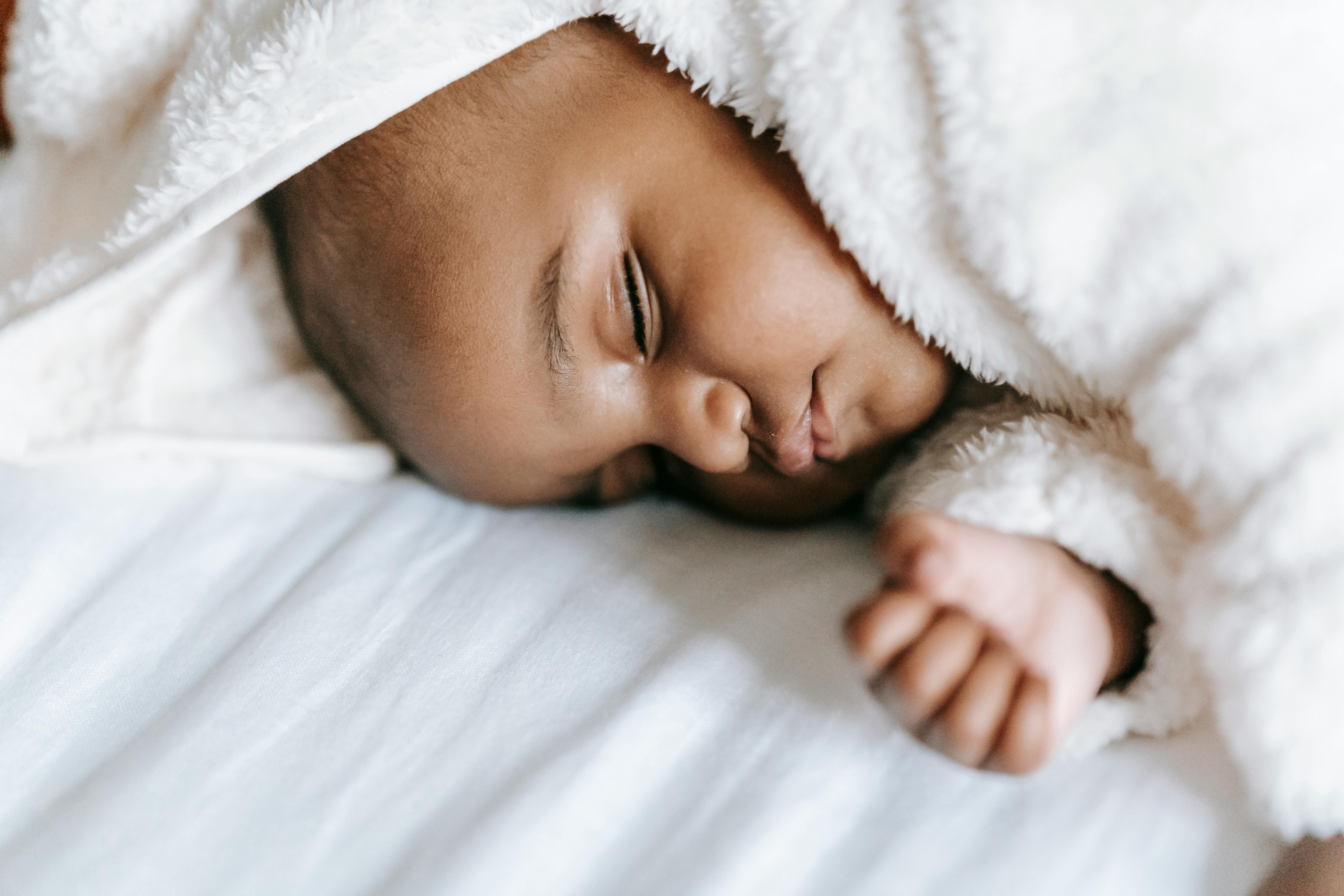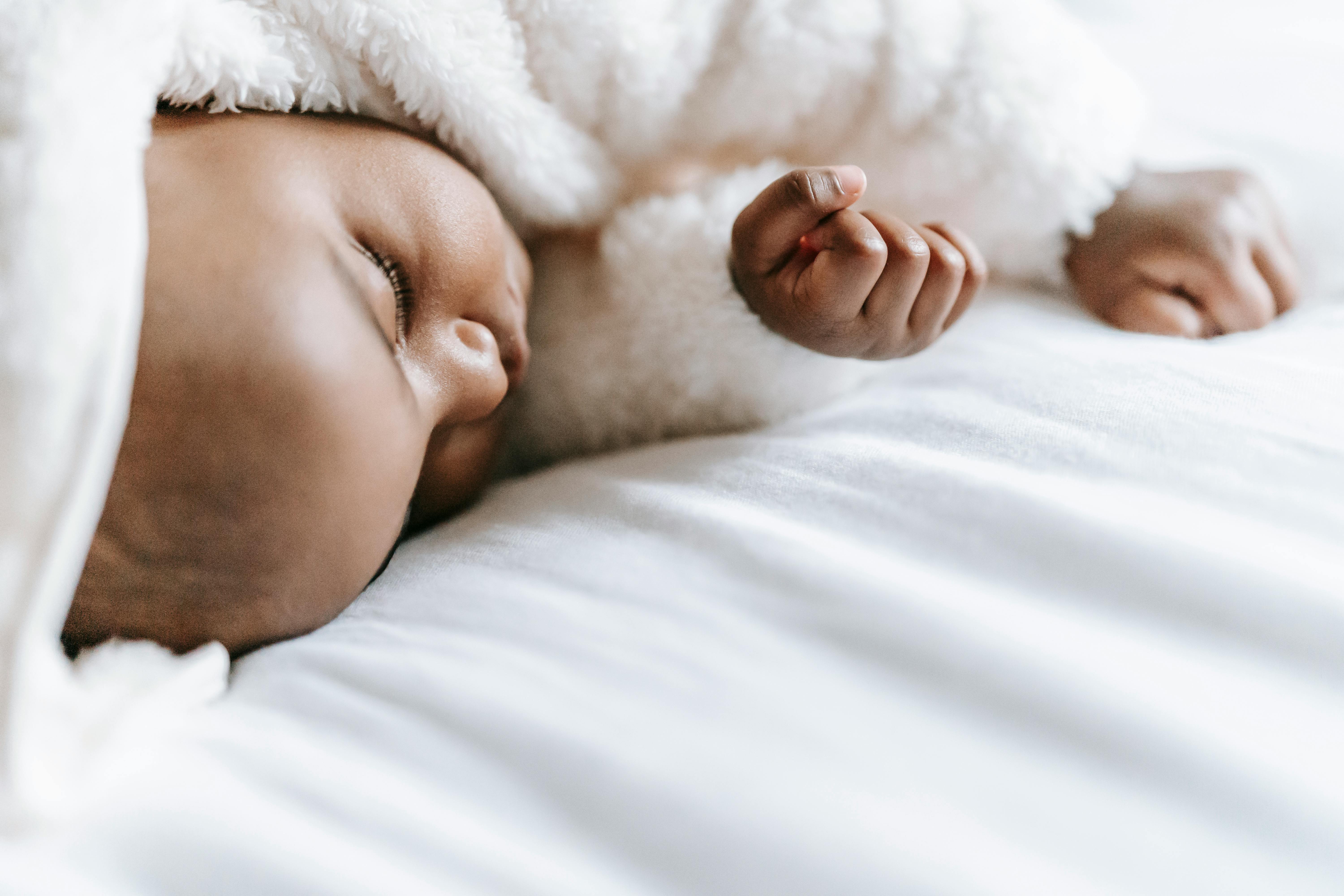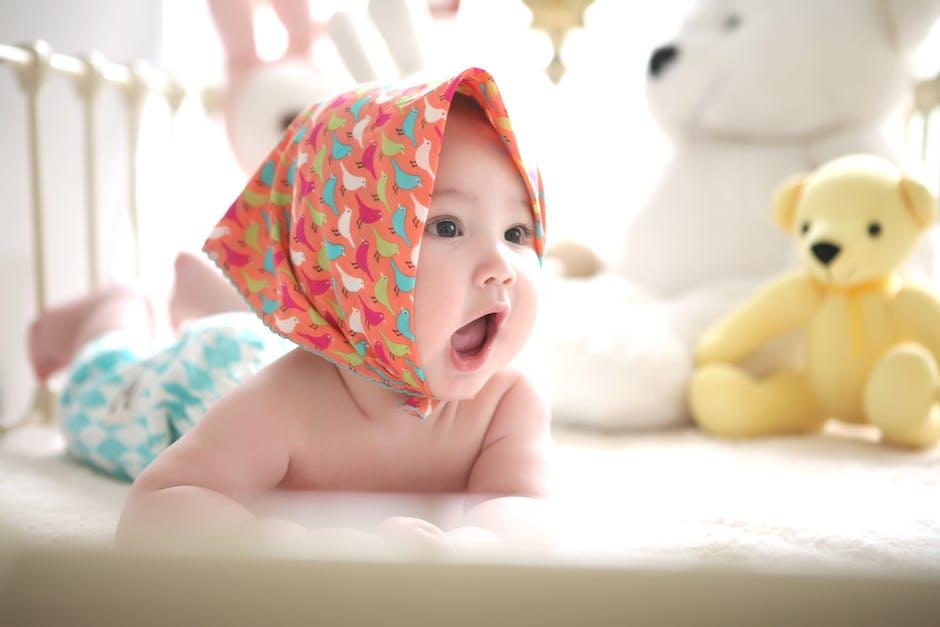Falling asleep can be a difficult task for babies. During this time, they may feel overwhelmed and become agitated, resulting in them scratching you. This behavior is usually due to them feeling overwhelmed or overstimulated and seeking comfort. In this article, we’ll discuss why babies scratch while falling asleep and how to manage it. We’ll also provide tips on soothing your baby during sleep time to prevent the scratching from occurring in the first place.It is common for babies to scratch their parents while falling asleep due to a reflex called the Moro reflex. This reflex, which is present in newborns, is triggered when they feel a sudden loss of support and causes them to flail their arms and legs in response. The baby may also gasp or cry as part of this reflex. In order to prevent your baby from scratching you while falling asleep, try swaddling them or providing extra support with your hands as they settle down.
Scratching During Sleep
Babies often scratch themselves during sleep, and there a few reasons why this happens. Most commonly, babies may be scratching themselves due to an itch caused by eczema, diaper rash, or other skin irritation. In these cases, the itching can become so intense that the baby isn’t aware of what they are doing and scratches themselves in their sleep. It is important to identify the source of the itching and treat it appropriately to prevent further scratching.
In some cases, babies may also scratch during sleep due to being too hot or uncomfortable. Babies are not able to regulate their own body temperature as well as adults, so if they feel too warm they may start scratching in an effort to cool down. This can be prevented by dressing them in cool clothes before bedtime and making sure their room is at a comfortable temperature.
Finally, some babies simply have an unconscious habit of scratching during sleep. This could be due to a number of factors such as stress or anxiety but is usually not anything to worry about. If the scratching persists or becomes excessive then it may be beneficial to speak with a doctor for advice on how to address the issue.
Is It Normal For Babies To Scratch During Sleep?
Yes, it is normal for babies to scratch during sleep. Babies have very active and curious minds which can sometimes lead to them scratching themselves during their sleep. This is because they explore the world around them through their fingers and hands, so when they fall asleep these same movements can still occur.
Often when babies scratch themselves while sleeping, it is a sign that they are feeling uncomfortable. This can be caused by anything from a minor irritation to a more serious underlying condition. Parents should always check with their pediatrician if their baby is scratching excessively during sleep in order to rule out any potential medical issues.
Though excessive scratching can be a sign of something more serious, it is not always the case. Some babies may scratch themselves more than others and this does not necessarily mean that there is an underlying problem. The most important thing for parents to do is to pay attention to their baby’s behavior and ensure that they are comfortable while sleeping.
If your baby is scratching excessively during sleep, try adjusting their bedding or clothing to see if this helps reduce the amount of scratching. You may also want to use softer fabrics such as cotton or silk which are less likely to irritate the skin. If the problem persists, then it would be wise to consult with your pediatrician in order to rule out any medical conditions that could be causing the excessive scratching.
Overall, it is normal for babies to scratch during sleep but if your baby seems uncomfortable or scratches too much then you should speak with your pediatrician in order to make sure there are no medical concerns that need addressing.
Determining If Baby Is Scratching Out Of Comfort Or Pain
It can be difficult to determine whether your baby is scratching out of comfort or pain. When a baby scratches, it can indicate that the baby is uncomfortable or in pain. That said, there are several factors that can help you decide if your baby’s scratching is due to comfort or pain.
Firstly, it’s important to look at the area that your baby is scratching. If the area appears to be red and irritated, this could indicate that your baby is in pain. Additionally, if the scratching is accompanied by other signs of discomfort such as crying, fussiness or difficulty sleeping, this could also indicate that the baby is in pain.
On the other hand, if there are no signs of discomfort and the area does not appear red or irritated, it could be an indication that your baby is simply trying to relieve an itch or seeking a comfort sensation. It can also be helpful to observe how often and how vigorously your baby is scratching as these can provide clues as to whether they are trying to satisfy an itch or expressing discomfort.
In conclusion, determining whether a baby’s scratching is out of comfort or pain can be difficult but by paying attention to signs such as skin irritation, intensity of scratching and any accompanying signs of discomfort you should have a better idea of why your baby might be scratching.
Should You Be Worried About Your Baby’s Scratching?
It is perfectly natural for babies to exhibit a certain level of curiosity and explore the world around them. However, if your baby is scratching at their skin or other objects, then you should be concerned and take action. Scratching can cause a range of issues, from minor irritation to serious infection. It is important to understand why your baby is scratching and take steps to address the issue.
The most common cause of baby scratching is itchy skin or an allergic reaction. Common irritants include pollen, pet dander, dust mites, and certain fabrics or detergents. If your baby seems to be reacting to something in their environment, you may need to make changes in order to reduce discomfort and scratching.
Another cause of scratching can be dry skin or eczema. Eczema tends to appear as red patches on the skin that are itchy and inflamed. If this is the case for your baby, then you should consult with a doctor who will likely recommend a moisturizing cream or ointment.
Babies can also scratch due to boredom or frustration when they are unable to communicate their needs verbally. If this is the case, then providing your baby with age-appropriate toys that encourage exploration may help alleviate the problem. Additionally, make sure they are getting plenty of attention during playtime so they do not become bored or frustrated easily.
In some cases, babies can scratch due to an underlying medical condition such as chickenpox or scabies. If this is suspected, it’s best to seek medical advice from your pediatrician as soon as possible in order to treat the condition quickly and effectively before it becomes more serious.
Scratching can be a sign of many different things so it’s important not to jump to conclusions too quickly when trying to identify the cause for your baby’s behavior. However, if you think there might be an underlying issue at play then it’s important that you take action quickly in order protect your child’s health and wellbeing.

Possible Causes of Baby’s Scratching While Falling Asleep
It is not uncommon for babies to scratch themselves while falling asleep. This behavior can be quite alarming for parents, and there are many possible causes. It could be due to a skin condition such as eczema, or the baby may have an allergy or sensitivity to something in their environment. It could also be a sign of stress or anxiety, as babies who are feeling overwhelmed may scratch themselves in an attempt to soothe and calm down.
In some cases, the scratching can also be caused by an underlying medical condition. If your baby has been diagnosed with a health problem such as reflux or acid reflux, they may scratch themselves as a result of discomfort or irritation from the condition. Additionally, a baby may scratch themselves if they are experiencing pain from teething or other irritations in their mouth.
It is important to rule out any potential medical cause before looking into other possibilities. If you think your baby is scratching due to a skin condition, it is best to consult with your pediatrician for advice on how to best manage it. They may recommend doing patch testing at home, using emollients or topical creams, or making lifestyle changes like switching laundry detergents.
If you think that the scratching is due to stress or anxiety, there are several things you can do to help reduce their distress levels. Try creating a calming bedtime routine that involves dim lighting and soothing music; giving them plenty of opportunities throughout the day for physical activity; and making sure they get enough sleep each night. You can also talk with your pediatrician about alternative therapies such as massage and aromatherapy that can help reduce stress levels in babies and young children.
Ultimately, it is important that all potential causes of baby’s scratching while falling asleep are taken into account and treated appropriately. If you are concerned about your baby’s scratching behaviors, make sure you speak with your pediatrician right away for advice on how best to proceed.
Allergies
Allergies can cause a baby to scratch while falling asleep. It could be an allergy to something in the environment such as dust mites, pet dander, pollen, or certain fabrics. If a baby has an allergic reaction to something, it can manifest in the form of itching and scratching. A doctor should be consulted to determine if allergies are causing the issue and what can be done to alleviate it.
Eczema
Eczema is a skin condition that is caused by allergies or environmental factors. It is characterized by dry, scaly patches of skin that can become red and inflamed when scratched or touched. Eczema can cause extreme itching and discomfort for babies, leading them to scratch while they are trying to fall asleep. Treatment for eczema may include topical ointments and creams as well as lifestyle changes such as avoiding triggers and using moisturizers regularly.
Hives
Hives are a skin condition that is caused by an allergic reaction or other irritant in the environment. They appear as raised red bumps on the skin that itch intensely when touched. Hives can cause babies to scratch while trying to fall asleep due to the uncomfortable sensation they cause from itching. Treatment for hives includes antihistamines and topical creams or ointments.
Seborrheic Dermatitis
Seborrheic dermatitis is a condition caused by an overgrowth of yeast on the skin. It appears as red patches with greasy scales that flake off when touched or scratched. Seborrheic dermatitis can cause intense itching which may lead babies to scratch while falling asleep. Treatment may include shampoos, topical medications, and lifestyle changes such as avoiding triggers and using moisturizers regularly.
Insect Bites
Insect bites can also cause babies to scratch while falling asleep due to the intense itching sensation they can cause. Treatment for insect bites includes antihistamines, topical creams, and cold compresses applied directly on the bite area.
Helping Stop Baby From Scratching When Falling Asleep
When a baby is trying to fall asleep, the last thing you want is for them to be scratching themselves. This can be very uncomfortable for your baby and can also cause skin irritation. Fortunately, there are some things you can do to help stop your baby from scratching when they are trying to fall asleep.
One of the best ways to prevent your baby from scratching is to keep their nails trimmed. Keeping their nails trimmed short will reduce the chances of them scratching themselves in their sleep. You should also make sure that their hands are kept clean and dry so that they don’t have any bacteria or dirt on them that could cause irritation.
If you notice that your baby is having trouble sleeping because of the itching, you may want to try applying a calming cream or lotion on their skin before bedtime. This will help soothe the skin and reduce any itching or irritation they may be feeling. You should also make sure that any pajamas or blankets they use at night are made from soft material, as this can help reduce any skin irritation as well.
It’s also important to keep an eye on your baby’s diet. Some foods can trigger allergic reactions which can lead to itching and scratching in some babies. If you notice this happening, try avoiding those foods for a few days and see if it makes any difference.
Finally, if none of these methods seem to be working, you may want to talk to a doctor about possible allergies or other medical conditions that could be causing your baby’s itching and scratching. With the right treatment, you should be able to stop your baby from scratching when they are trying to fall asleep.
Conclusion
The most important thing you can do when it comes to helping stop your baby from scratching when falling asleep is keeping their nails trimmed short and ensuring their hands are clean and dry before bedtime. You should also look into applying calming creams or lotions as well as making sure any clothing items they use at night are made from soft material. Finally, it’s important to keep an eye on their diet as certain foods may trigger allergic reactions which could lead to itching and scratching in some cases too. If none of these methods work then it may be worth talking with a doctor about potential allergies or medical conditions which may need treating in order for the problem to go away for good!

Conclusion
Although it is natural for babies to scratch while falling asleep, it can be a sign of an underlying issue. Therefore, it is important to pay close attention to your baby’s behavior when they are trying to fall asleep. If your baby continues to scratch while falling asleep, consult your pediatrician as soon as possible so they can recommend the best course of action.
You can also take proactive steps to prevent scratching in the first place. This includes keeping nails trimmed, providing a soothing environment before bedtime, and using a gentle swaddle or sleep sack with no loose clothing or blankets that could irritate your baby’s skin. With these measures in place, you can help your baby fall asleep peacefully without having to worry about scratching.
In conclusion, babies may scratch while falling asleep for various reasons. While this is common and usually not cause for concern, it is best to take preventive measures and address any underlying issues that could be causing the scratching behavior. With the right approach, you can help ensure that both you and your baby have a peaceful night’s rest.




